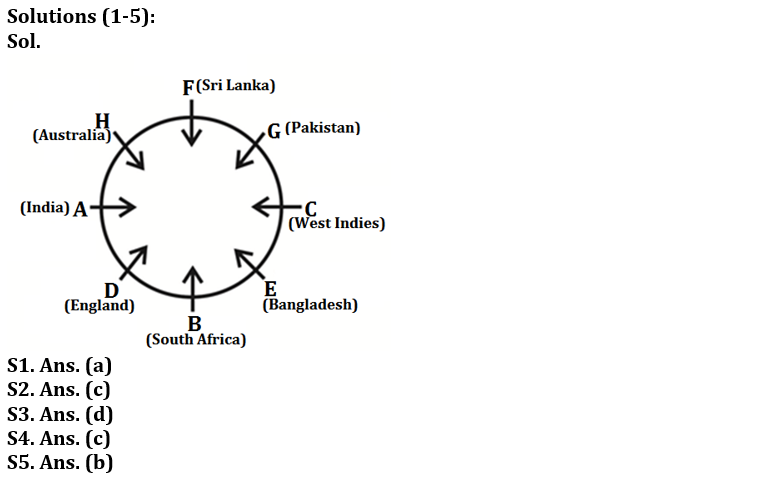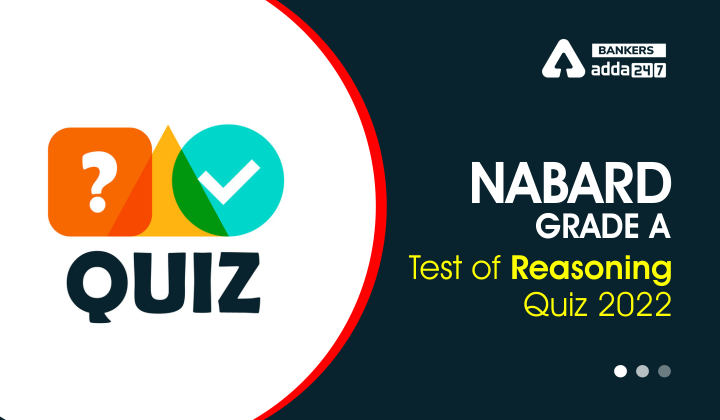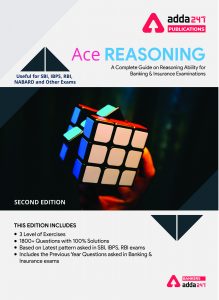Directions (1-5): Study the following information carefully and answer the questions given below:
Eight Cricketers sit around a circular table facing the center. Each of them is from different country. F sits second to the left of A. The one who is from Australia is an immediate neighbor of A. There are only three people sitting between the one who is belongs to Australia and E. Only one person sits between the one who belongs to England and E. The one who belongs to South Africa sits immediate right of the one who belongs to England. B is second to the right of A. H belongs to Australia. G and C are immediate neighbors of each other. Neither G nor C belongs to England. The one who belongs to Pakistan is immediate left of F. The one who belongs to West Indies is second to the right of the one who belongs to South Africa. The one who belongs to India is an immediate neighbor of the one who belongs to England. G is second to the right of the one who belongs to Bangladesh. D sits third to the right of the one who belongs to Sri Lanka.
Q1. Who among the following sits second to the left of the one who belongs to West Indies?
(a) B
(b) A
(c) F
(d) D
(e) C
Q2. Who among the following belongs to Pakistan?
(a) D
(b) A
(c) G
(d) E
(e) F
Q3. Which of the following statement is true about A?
(a) F sits third right of A
(b) A belongs to South Africa
(c) Only two persons sit between A and F
(d) A belongs to India
(e) A sits immediate left of G
Q4. What is the position of C with respect to H?
(a) Immediate left
(b) Second to the right
(c) Third to the left
(d) Fourth to the right
(e) None of these
Q5. Who among the following facing the one who belongs to Bangladesh?
(a) B
(b) H
(c) G
(d) F
(e) C
Q6. If all the letters in the word ORANGE are arranged in alphabetical order from left to right in such a way that one vowel is arranged followed by one consonant, then second vowel is arranged followed by consonants and so on. How many letters are there in between G and R after the arrangement?
(a) Three
(b) One
(c) None
(d) Two
(e) Five
Q7. If in the number 476592418, 5 is added to each of the digit which is less than three and 2 is subtracted from each of the digit which is greater than three then how many digits are repeating in the number thus formed?
(a) One
(b) Two
(c) none
(d) Four
(e) Three
Q8. Which of the following will be definitely true if the given expression W=L≥O=M>U≥C>H≥Q>P is definitely true?
(a) W <U
(b) L ≥ P
(c) P > M
(d) O ≥ H
(e) C < L
Q9. The position of how many alphabets will remain unchanged if each of the alphabets in the word ‘SIGNIFICANT’ is arranged in alphabetical order from left to right?
(a) Two
(b) Three
(c) One
(d) Four
(e) Five
Q10.Which of the following elements should come in a place ‘?’ ?
IR10 KP12 MN14 OL16 ?
(a) RS19
(b) RI19
(c) QR18
(d) QJ18
(e) None of these
Directions (11-13): Study the following information carefully and answer the given questions.
Amongst five persons, P, R, S, T and U, each has different weight. P’s weight is more than R and T. S weight is less than U. Only two persons weight is more than P whose weight is 65kg. Youngest person weight is 55kg.
Q11. Who among the following is youngest person?
(a) U
(b) R
(c) S
(d) T
(e) Can’t be determined
Q12. If U’s weight is 70kg, then what may be the weight of S?
(a) 63
(b) 64
(c) 68
(d) 72
(e) None of these
Q13. How many persons are heavier than R?
(a) One
(b) Two
(c) Three
(d) None
(e) Can’t be determined
Q14.How many pairs of letters are there in the word ‘TRADITIONAL’, each of which have as many letters between then in the word as they have between then in the English alphabet?
(a) More than Four
(b) One
(c) Three
(d) Two
(e) None
Q15. Adarsh ranked 25th from the top and 36th from the bottom in a class. How many students are there in the class?
(a) 61
(b) 59
(c) 52
(d) 58
(e) 60
Solutions

S6. Ans. (a)
Sol. Original word- ORANGE
Obtained word- AGENOR
S7. Ans. (e)
Sol. Original Number- 476592418
Obtained Number- 254377266
S8. Ans. (e)
S9. Ans. (b)
Sol. Original word- SIGNIFICANT
Obtained word-ACFGIIINNST
S10. Ans. (d)
Sol. The arrangement will be: U > S > P > R/T > T/R
S11. Ans. (e)
Sol. The arrangement will be: U > S > P > R/T > T/R
S12. Ans. (c)
Sol. The arrangement will be: U > S > P > R/T > T/R
S13. Ans. (e)
Sol. The arrangement will be: U > S > P > R/T > T/R
S14. Ans. (c)
Sol. LO, LN, NO
S15. Ans(e)
Sol. Number of students in the class= 25+36-1=60





 GA Capsule for SBI Clerk Mains 2025, Dow...
GA Capsule for SBI Clerk Mains 2025, Dow...
 The Hindu Review October 2022: Download ...
The Hindu Review October 2022: Download ...
 IIFCL Assistant Manager Result 2025 Out,...
IIFCL Assistant Manager Result 2025 Out,...





